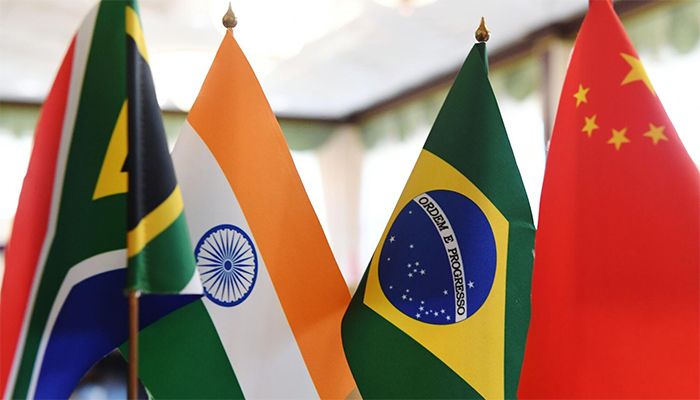
International Desk
Publish: 22 Aug 2023, 12:54 pm

Photo: Collected
An extension of the BRICS bloc is being discussed at a meeting this week, and it has drawn a diverse group of possible candidates, from Argentina to Iran, who all share the aim to level what many see as an unfair playing field in the international arena.
The list of complaints is extensive. unfair business methods. sanctions regimes that punish. perceived disregard for the needs of developing countries. international organizations like the United Nations, the International Monetary Fund, and the World Bank are dominated by the rich West.
Amid widespread dissatisfaction with the prevailing world order, the pledge of BRICS nations - currently Brazil, Russia, India, China and South Africa - to make the grouping a leading champion of the "Global South" has, despite a dearth of concrete results, found resonance.
Over 40 countries have expressed interest in joining BRICS, say officials from South Africa, which is hosting the 22-24 Aug summit. Of them, nearly two dozen have formally asked to be admitted.
"The objective necessity for a grouping like BRICS has never been larger," said Rob Davies, South Africa's former trade minister, who helped usher his country into the bloc in 2010.
"The multilateral bodies are not places where we can go and have an equitable, inclusive outcome."
Observers, however, point to an underwhelming track record they say does not bode well for BRICS's prospects of delivering on the lofty hopes of prospective members.
Though home to some 40% of the world's population and a quarter of global GDP, the bloc's ambitions of becoming a global political and economic player have long been thwarted by internal divisions and a lack of coherent vision.
Its once booming economies, notably heavyweight China, are slowing. Founding member, Russia, is facing isolation over the Ukraine war. President Vladimir Putin, wanted under an international arrest warrant for alleged war crimes, will not travel to Johannesburg and only join virtually.
"They may have over-inflated expectations of what BRICS membership will actually deliver in practice," said Steven Gruzd from the South African Institute of International Affairs.
Even while BRICS hasn't released a complete list of candidates for expansion, a number of nations have openly shown their interest.
Iran and Venezuela are attempting to lessen their isolation as a result of the bloc's sanctions and are hoping that it would help their ailing economies.
The hegemonic worldview promoted by the US administration has rendered other global integration frameworks blind, according to Ramón Lobo, a former finance minister and governor of Venezuela's central bank, who spoke to Reuters.
Analysts claim that Gulf nations Saudi Arabia and the United Arab Emirates saw BRICS as a means of gaining a more significant position within international organizations.
African candidates Ethiopia and Nigeria are drawn by the bloc's commitment to reforms at the United Nations that would give the continent a more powerful voice. Others want changes at the World Trade Organization, International Monetary Fund and World Bank.
"Argentina has insistently called for a reconfiguration of the international financial architecture," an Argentine government official involved in the negotiations to join BRICS told.
BRICS public positions already reflect many of these concerns.
And as it seeks to become a counterweight to the West, amid China's tensions with the United States and the fallout of Russia's invasion of Ukraine, growing its membership could lend the bloc and its global reform message more clout.
In the run-up to the summit, however, the grouping's shortcomings are in the spotlight.
While BRICS leaders at the summit are expected to discuss a framework for admitting new members with China and Russia keen to forge ahead with expansion, others, notably Brazil, are worried about rushing the process.
The tangible benefits to joining, meanwhile, are waning.
The bloc's most concrete achievement, the New Development Bank, or "BRICS bank", has seen its already sluggish pace of lending further hobbled by sanctions against founding member Russia.
Small countries hoping for an economic boost from BRICS membership might look to South Africa's experience.
Its BRICS trade has indeed increased steadily since it joined, according to an analysis by the country's Industrial Development Corporation.
But that expansion is mostly due to imports from China, and the country still only makes up a fifth of all bilateral commerce between South Africa and the rest of the world. Only 0.6% of its exports are taken in by Brazil and Russia combined, and by last year, South Africa's trade imbalance with the BRICS countries had increased four-fold, to $14.9 billion, from 2010.
Such consequences should cause potential countries to hesitate, according to Gruzd.
Concrete BRICS accomplishments are hard to come by. a lot of talking. There is far less activity.
Subscribe Shampratik Deshkal Youtube Channel
Topic : BRICS Global Balance South Africa Brazil
© 2024 Shampratik Deshkal All Rights Reserved. Design & Developed By Root Soft Bangladesh